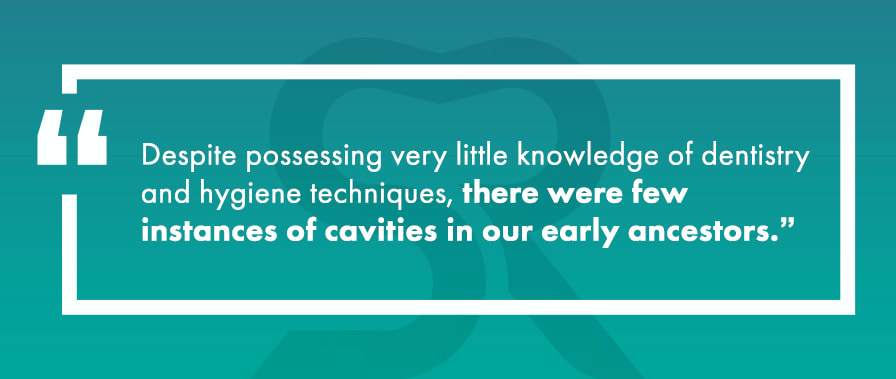|
Teeth last a long time if you take care of them... It may seem counterintuitive but cavemen did not have many dental issues. The notion of a caveman with healthy teeth contradicts popular sentiment of our primitive ancestors, but according to fossil discoveries, this is the case. Fossils of hominids which were dated prior to the advent of agriculture did not have noticeable dental issues. Despite possessing very little knowledge of dentistry and hygiene techniques, there were few instances of cavities in our early ancestors. Scientists hypothesize that the reason for the absence of identifiable dental issues is attributed to the lack of processed foods and carbohydrates available prior to the expansion of farming. Naturally occurring sugars are very rare and would not be a part of early man’s diet. With less sugar available for consumption, there was less prevalence of pathogenic bacteria which cause the breakdown of enamel which causes cavities. “Hunter-gatherers had really good teeth,” says Alan Cooper, Ph.D., director of the Australian Centre for Ancient DNA. “[But] as soon as you get to farming populations, you see this massive change. Huge amounts of gum disease. And cavities start cropping up.” According to Cooper and his team, the gradual shift in human diets from meat, nuts and vegetables to carbohydrates and sugar effectively altered the makeup of bacteria in the mouths of modern men and women, National Public Radio reported. Researchers examined the teeth found in 34 prehistoric skulls and determined that, specifically as ancient man took to tilling the fields and focusing on agriculture in favor of hunting, particular forms of harmful bacteria began to infiltrate human mouths. Disease-causing pathogens specializing in devouring carbohydrates helped deteriorate human teeth. The introduction of pre-processed sugar and flour in the late 19th century during the Industrial Revolution hastened the decline of teeth. “What you’ve really created is an ecosystem which is very low in diversity and full of opportunistic pathogens that have jumped in to utilize the resources which are now free,” added Cooper. Techniques from ancient dentistry While Cooper’s study suggests that prehistoric man enjoyed greater oral health due to diet, another report published in PLoS One has revealed more information about possible early dentistry techniques. Led by Federico Bernardini and Claudio Tuniz, of the Abdus Salam International Centre for Theoretical Physics in Italy, researchers in Italy and Australia made remarkable discoveries while examining the remains of a 6,500-year-old human jawbone, Medical News Today reported. Specifically, a tooth found with the jaw near Trieste in Slovenia hints at possible methods used to fill cavities by dentists during earlier times. The tooth, which is a left canine, was found to have traces of beeswax in the crown. “This finding is perhaps the most ancient evidence of prehistoric dentistry in Europe and the earliest known direct example of therapeutic-palliative dental filling so far,” said Bernardini. Bernardini and Tuniz used a variety of tools, including synchrotron radiation computed micro-tomography, accelerator mass spectrometry radiocarbon dating, infrared spectroscopy and scanning electron microscopy to prod more deeply into the tooth. Due to the condition of the tooth, researchers believe the person who received the filling may have been near-death or perhaps already dead by the time the procedure was completed. “If the filling was done when the person was still alive, the intervention was likely aimed to relieve tooth sensitivity derived from either exposed dentine and/or the pain resulting from chewing on a cracked tooth,” wrote the study’s authors. Teeth have weathered erosion for thousands of years. Our teeth are resilient if they are taken care of properly. Make sure you take the proper measures to protect your teeth. Brush your teeth twice a day, floss frequently, limit sugary treats and carbohydrates, and get treated for dental health issues before your oral health deteriorates. Ensure you make regular appointments to see your dentist and dental hygienists. Call us today to set an appointment!
4 Comments
|
AuthorBraden Mathur is a Archives
March 2020
Categories |
IF YOU HAD A WONDERFUL EXPERIENCE WITH SENECA RIDGE DENTAL, PLEASE SHARE YOUR THOUGHTS IN OUR LINK TO MAKE A GOOGLE REVIEW!
At Seneca Ridge Dental, we believe in providing West Seneca and the surrounding Buffalo, NY area with the best possible dental care using state of the art dental technology and modern best practices. |
SENECA RIDGE DENTALSouthtowns | 3626 Seneca St. West Seneca, NY 14224Northtowns | 145 Belmont Ave. Suite 1 Buffalo, NY 14223 |
Contact UsSouthtowns 716.674.9444Northtowns 716.873.3966M: 8:30am - 5:00pm
T: 9:00am - 7:00pm Wed: By Appointment Only Th: 8:30am - 5pm F: By Appointment Only Sat/Sun: Closed |


 RSS Feed
RSS Feed